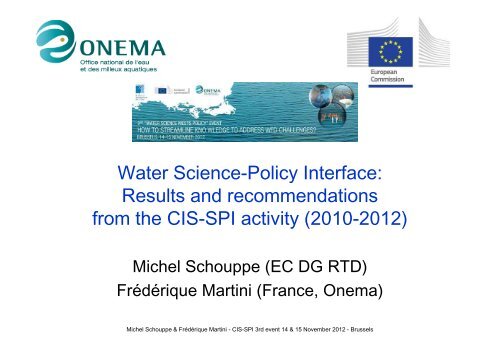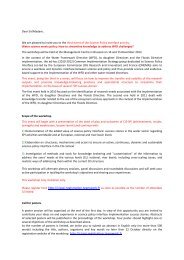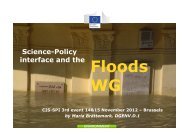The WFD CIS-SPI activity - 3rd 'Water Science Meets Policy' Event
The WFD CIS-SPI activity - 3rd 'Water Science Meets Policy' Event
The WFD CIS-SPI activity - 3rd 'Water Science Meets Policy' Event
Create successful ePaper yourself
Turn your PDF publications into a flip-book with our unique Google optimized e-Paper software.
Water <strong>Science</strong>-Policy Interface:<br />
Results and recommendations<br />
from the <strong>CIS</strong>-<strong>SPI</strong> <strong>activity</strong> (2010-2012)<br />
Michel Schouppe (EC DG RTD)<br />
Frédérique Martini (France, Onema)<br />
Michel Schouppe & Frédérique Martini - <strong>CIS</strong>-<strong>SPI</strong> <strong>3rd</strong> event 14 & 15 November 2012 - Brussels
Common Implementation Strategy (<strong>CIS</strong>)<br />
• <strong>CIS</strong> is a forum of<br />
cooperation to tackle<br />
challenges raised by the<br />
<strong>WFD</strong> implementation<br />
• Aims of the <strong>CIS</strong>:<br />
– coherent and harmonious<br />
implementation<br />
– common understanding and<br />
approach<br />
• Organised around activities<br />
(working groups, expert<br />
groups, ad hoc activities)<br />
Hydromorphology<br />
Ad hoc activities<br />
Economics<br />
Michel Schouppe & Frédérique Martini - <strong>CIS</strong>-<strong>SPI</strong> <strong>3rd</strong> event 14 & 15 November 2012 - Brussels<br />
Biodiversity<br />
<strong>Science</strong> Policy Interface
Ad-hoc <strong>activity</strong> on water <strong>Science</strong>-Policy<br />
Main objectives :<br />
Interface (<strong>CIS</strong>-<strong>SPI</strong>)<br />
• to support the implementation of the Water Framework Directive<br />
by ensuring a dynamic interface between researchers, policy makers,<br />
water managers, and other stakeholders including NGOs<br />
• to boost usability of scientific research outputs to stimulate evidence-<br />
based decisions within the <strong>CIS</strong> framework<br />
• to identify research needs and formulate research questions with<br />
increased involvement of practitioners implementing the <strong>WFD</strong><br />
<strong>CIS</strong>-<strong>SPI</strong> mandate (2010-2012) by the Water Directors of the EU:<br />
• Task 1 : Inventory of research & implementation needs from <strong>CIS</strong> groups<br />
• Task 2 : Available research and research gaps assessments<br />
• Task 3 : Improving transfer and usability of research<br />
Co-leaders: France (ONEMA) and EC (DG RTD)<br />
Michel Schouppe & Frédérique Martini - <strong>CIS</strong>-<strong>SPI</strong> <strong>3rd</strong> event 14 & 15 November 2012 - Brussels
<strong>CIS</strong>-<strong>SPI</strong> - Working principles<br />
• Implemented on best effort and voluntary bases<br />
– Follows the overall <strong>CIS</strong> spirit of informal co-operation<br />
based on the principles of openness and transparency,<br />
encouraging creative participation of interested parties<br />
• 'Ad hoc' thus subject to one-off activities in 2010-2012<br />
• Mainly implemented through yearly <strong>SPI</strong> workshops « Water<br />
science meets policy »: gathering researchers, stakeholders,<br />
experts, policy-makers, water managers and EU officials<br />
• Close links with <strong>CIS</strong> groups (<strong>SPI</strong> correspondents)<br />
• Regular reports to Strategic Coordination Group (SCG)<br />
and to the group of the Water Directors of the EU<br />
• In connection with recent water initiatives in Europe<br />
such as the JPI and EIP on water<br />
Michel Schouppe & Frédérique Martini - <strong>CIS</strong>-<strong>SPI</strong> <strong>3rd</strong> event 14 & 15 November 2012 - Brussels
<strong>CIS</strong><br />
Working<br />
Groups<br />
<strong>CIS</strong>-<strong>SPI</strong> – Methodology<br />
Survey of<br />
research needs<br />
- Questionnaires<br />
- Intreviews<br />
- Papers<br />
<strong>CIS</strong> - <strong>SPI</strong><br />
ad hoc<br />
Activity<br />
Input for<br />
Round Tables<br />
Annual events<br />
« Water <strong>Science</strong><br />
meets Policy »<br />
Survey of policy<br />
relevant input<br />
- Reports<br />
- Newsletters<br />
- Policy briefs<br />
Participation Participation<br />
Connecting scientists and <strong>WFD</strong> end-users<br />
Research needs & gaps<br />
Improved <strong>SPI</strong> & dissemination<br />
Reporting to SCG and the Water Directors<br />
Michel Schouppe & Frédérique Martini - <strong>CIS</strong>-<strong>SPI</strong> <strong>3rd</strong> event 14 & 15 November 2012 - Brussels<br />
FP6 – FP7<br />
Project<br />
Consortia
<strong>CIS</strong>-<strong>SPI</strong> – Some results<br />
<strong>CIS</strong>-<strong>SPI</strong> community of practice<br />
• <strong>CIS</strong>-<strong>SPI</strong> leading organisations and secretariat<br />
– ONEMA (FR) assisted by OiEAU<br />
– DG RTD (EC) supported by the FP7 <strong>SPI</strong> cluster<br />
(Waterdiss, STREAM, STEP-WISE) and PSI-CONNECT<br />
• <strong>CIS</strong>-<strong>SPI</strong> correspondents in each <strong>CIS</strong> group<br />
– to mainstream <strong>SPI</strong> aspects in their group<br />
– to prioritise needs and research gaps in the thematic field of their group<br />
– to participate in the preparation of the science meets policy events<br />
– to organise <strong>SPI</strong> sessions or presentations on the meetings of their group<br />
– Focal points for the research community, link to relevant RTD projects<br />
• Call for <strong>CIS</strong>-<strong>SPI</strong> focal points from the Member States<br />
• Wider <strong>SPI</strong> community in Europe<br />
– participants to the <strong>CIS</strong>-<strong>SPI</strong> annual events and other <strong>SPI</strong> events<br />
organised by EC and ONEMA (e.g. Green Week 2012, WWF6)
<strong>CIS</strong>-<strong>SPI</strong> – Some results<br />
« Water <strong>Science</strong> meets Policy » #1<br />
• Brussels, 30 September 2010<br />
• 150 participants from 16 countries<br />
• 35% from the scientific community,<br />
65% from <strong>WFD</strong> “end-users”<br />
• Strong interactions: nine parallel<br />
round tables, plus two plenary<br />
sessions<br />
• Identification of 59 research areas<br />
including about 180 specific<br />
research issues<br />
• Research needs cover the all range<br />
from fundamental research to studies<br />
or synthesis-integration of knowledge
<strong>CIS</strong>-<strong>SPI</strong> – some results<br />
« Water <strong>Science</strong> meets Policy » #2<br />
• Brussels, 29-30 September 2011<br />
• Clarification of ecosystem services<br />
concepts in light of the <strong>WFD</strong><br />
implementation and first steps towards a<br />
common language among scientists<br />
and forefront stakeholders at EU,<br />
national and river basin levels<br />
• Recommendations on how ecosystem<br />
services can be used and valued, for<br />
integrated watershed management as<br />
well as for <strong>WFD</strong> implementation based<br />
on a collection of tangible examples in<br />
Europe<br />
• Identification of research gaps for<br />
further understanding of ecosystem<br />
services in the context of the <strong>WFD</strong>.<br />
110 participants from 19 countries: policy makers (42 %), scientists (34 %),<br />
water managers (11 %) and representatives of the private sector (13 %).
<strong>CIS</strong>-<strong>SPI</strong> – Some results<br />
« Water <strong>Science</strong> meets Policy » #3<br />
• Brussels, 14-15 November 2012<br />
• Presentation of <strong>SPI</strong> success stories in the water sector at international, national<br />
and river basin levels<br />
• Elaboration on structures, mechanisms and actors to ensure an active,<br />
continuous, dynamic and sustainable science-policy interface in the <strong>CIS</strong> context<br />
• Investigation on methods and tools for knowledge brokering and<br />
"customisation" of the information to address the users' needs at the various<br />
levels (EU, national, river basin), including cross-scaling issues, and realistic ways<br />
of addressing them within the current <strong>CIS</strong> structure<br />
-> Provision of a range of <strong>SPI</strong> operational modalities for possible implementation in<br />
the context of an evolving <strong>CIS</strong>
<strong>CIS</strong>-<strong>SPI</strong> – Some results<br />
Joint FP7 water projects meeting<br />
back to back with an SCG meeting<br />
1) Brainstorming meeting among<br />
scientists open to SCG members<br />
on 7th November 2011<br />
– Instead of providing information at project<br />
level, representatives of key research<br />
projects have been invited<br />
to provide collectively<br />
policy-relevant information<br />
– Outputs: a snapshot of available results<br />
and research perspectives on <strong>CIS</strong> WG<br />
themes + projects synopsis<br />
– Ecological Status, Floods, Water Scarcity<br />
and Drought, Climate Change and<br />
Adaptation<br />
2) <strong>The</strong>matic presentations to the SCG<br />
covering relevant <strong>CIS</strong> groups<br />
on 8 November 2011
<strong>CIS</strong>-<strong>SPI</strong> – Some results<br />
Policy briefs<br />
• Collection of 34 policy briefs from<br />
23 EU-funded research projects of<br />
direct relevance to the <strong>WFD</strong><br />
• Analysis and proposal for a<br />
standard <strong>CIS</strong>-<strong>SPI</strong> policy brief<br />
template (based on the model<br />
proposed by DG RTD for use by the<br />
XEROCHORE project)
<strong>CIS</strong>-<strong>SPI</strong> – Some results<br />
New release of WISE-RTD<br />
(http://www.wise-rtd.info/en)<br />
• WISE-RTD (www.wise-rtd.info/en) is the ‘research & projects’ component of WISE<br />
and an interface between science & policy for Water<br />
• About 1000 projects (FP3-FP7, LIFE, INTERREG) by end of this year<br />
• Upload facility for RTD projects. Set of intricate algorithms that define sciencepolicy<br />
interactions. Automatic linking to the diverse sets of Directives related to EU<br />
water policies<br />
• Guided search for policy implementers or researchers and e-learning tool<br />
• Expanded through the ongoing FP7 STEP-WISE project<br />
(a member of the <strong>SPI</strong>-WATER cluster – see www.spi-water.eu)
<strong>CIS</strong>-<strong>SPI</strong> – Some results<br />
Mapping of FP6 & FP7 ENV projects<br />
per <strong>CIS</strong> topic and research areas<br />
(Contributed by the FP7 WATERDISS project)
<strong>CIS</strong>-<strong>SPI</strong> – Some results<br />
Mapping of 10 years of FP projects<br />
per topic of the <strong>CIS</strong> groups<br />
• Snapshot of a significant part of waterrelated<br />
research projects funded under<br />
FP6 and FP7 (2002-2011).<br />
• 800+ projects; not only collaborative<br />
projects, but also Marie Curie fellowships,<br />
infrastructure, INCO projects, etc…<br />
• Attempt to sort the projects<br />
per main <strong>CIS</strong> policy-relevant topic:<br />
– climate change,<br />
– ecological status,<br />
– floods,<br />
– groundwater,<br />
– hydro-morphology,<br />
– <strong>Science</strong> policy interface,<br />
– socio-economy,<br />
– water and agriculture,<br />
– water scarcity and droughts.<br />
http://ec.europa.eu/research/environment/pdf/green-week-2012.pdf
<strong>CIS</strong>-<strong>SPI</strong> – Some results<br />
Top ten research needs for each <strong>CIS</strong><br />
group and mapping of knowledge<br />
• To consolidate research issues pre-identified during the <strong>CIS</strong>-<strong>SPI</strong> events<br />
• Use of a standard questionnaire sent to each <strong>CIS</strong> group<br />
• Diverse validation approaches developed by each of the <strong>CIS</strong> groups<br />
Research<br />
issue<br />
1.Developing<br />
and validating<br />
new<br />
Bioassessment<br />
tools<br />
Research<br />
need<br />
1. To<br />
overcome<br />
knowledge<br />
gaps for<br />
transitional<br />
and coastal<br />
waters.<br />
Research issue description Partially covered by<br />
<strong>The</strong> intercalibration exercise has<br />
highlighted the lack of relevant metrics<br />
and compliant assessment tools for the<br />
<strong>WFD</strong> implementation. More<br />
fundamentally the participants consider<br />
that the taxonomy – and especially the<br />
taxonomist formation – should be<br />
enhanced to sustain the development of<br />
new relevant metrics and to strengthen<br />
the expertise capacity of water managers.<br />
CF2<br />
QWATER-(FP7)<br />
Bioassay integration under the European Water Framework Directive: A step<br />
towards an ecological approach-[source CORDIS]<br />
AQUAREHAB (FP7)<br />
Development of rehabilitation technologies and approaches for multipressured<br />
degraded waters and the integration of their impact on river basin management<br />
https://aquarehab.vito.be/ [source CORDIS]<br />
WETwin (FP7)<br />
to enhance the role of wetlands in basin-scale integrated water resources<br />
management (IWRM), with the aim of improving the community service<br />
functions while conserving good ecological status - Tools related to wetlands<br />
(transitional waters) are being used/developed;<br />
WISER (FP7)<br />
Water bodies in Europe: Integrative Systems to assess Ecological status and<br />
Recovery - Deliverables 4.1-1 to 4.4-5, (www.wiser.eu )
Diapositive 15<br />
CF2 as defined by each?<br />
FRAGAKIS Christos (RTD); 08/11/2012
<strong>CIS</strong>-<strong>SPI</strong> – Some lessons learnt<br />
• Time resource is amongst the main constrains in a voluntary best effort<br />
approach<br />
– Work overload of <strong>CIS</strong> members was a constrain to get timely, prioritised, complete input<br />
by all <strong>CIS</strong> groups<br />
• Knowledge exchange has to be seen as a continuum. This calls for:<br />
– Permanent <strong>SPI</strong> support and structures<br />
– A strong <strong>SPI</strong> identity across the whole <strong>CIS</strong><br />
(not just relying on the dynamism of a few motivated persons)<br />
– Relays at national and regional levels<br />
– A core group of well trained facilitators / translators<br />
– A consolidated methodology combining different approaches to conduct surveys<br />
(questionnaires, meetings, <strong>SPI</strong> correpsondents participating to other groups' meetings)<br />
• Research questions and policy questions have to be developed together<br />
– Co-creation and sharing of knowledge<br />
• Providing templates (e.g. for policy briefs) is not sufficient. Promoting their use and<br />
providing a mechanism for systematic delivery and feedback by policy makers are<br />
required<br />
• Expected results from projects should be made known at the start, with regular<br />
feedback loops and final outcomes stored in few permanent locations
<strong>CIS</strong>-<strong>SPI</strong> – Some recommendations<br />
• To move from an ad hoc experience of <strong>SPI</strong> towards a more systematic<br />
<strong>activity</strong> relying on a sustained <strong>SPI</strong>-network closely connected with the <strong>CIS</strong><br />
structure involving <strong>SPI</strong> correspondents and appropriately resourced<br />
• To adopt <strong>SPI</strong> as a pervasive <strong>CIS</strong> working principle and mainstream <strong>SPI</strong><br />
objectives and methodologies across all levels of the <strong>CIS</strong> in order to<br />
improve efficiency and consolidate today’s <strong>SPI</strong> approaches by the WGs<br />
• To enhance transfer and sharing of knowledge and experience focusing on<br />
<strong>CIS</strong> themes through:<br />
– Testing and validating various tools / methods in close connection with <strong>CIS</strong><br />
experts<br />
– developing guidance to EU and national R&D projects<br />
– agreeing on repositories and inventing alert systems to enable transfers down<br />
to policy makers and implementers at the catchment scale<br />
• To consolidate and implement a methodology for more regular mapping of<br />
research and prioritisation of research gaps<br />
– to regularly feed research call programming at EU and national / regional levels
<strong>CIS</strong>-<strong>SPI</strong>: Next milestones and follow-up<br />
– Third annual event: completion and reporting<br />
– Final <strong>CIS</strong>-<strong>SPI</strong> report (2010-2012)<br />
– Presentation of these report to European<br />
water directors of the EU (publication)<br />
– Evaluation of first mandate<br />
and preparation of follow-up activities
Thank you for attention




